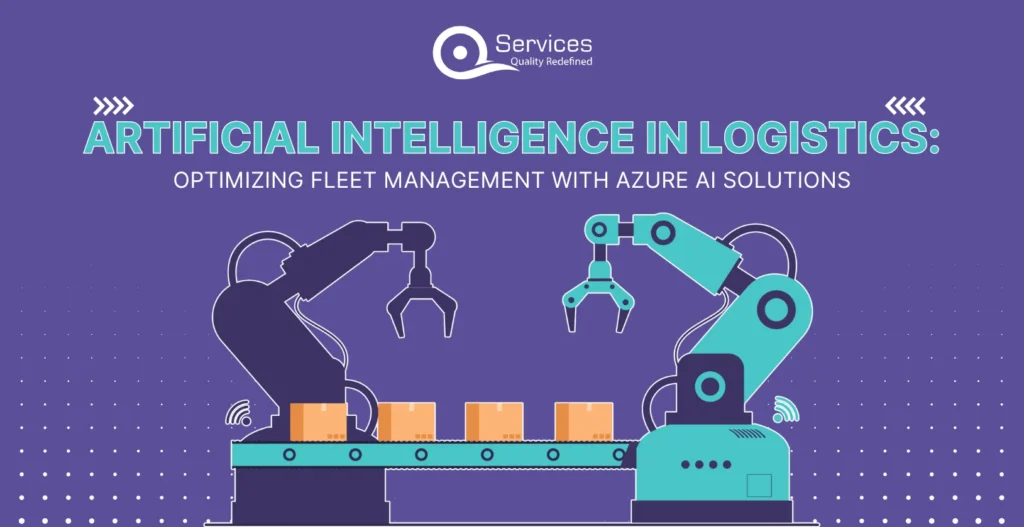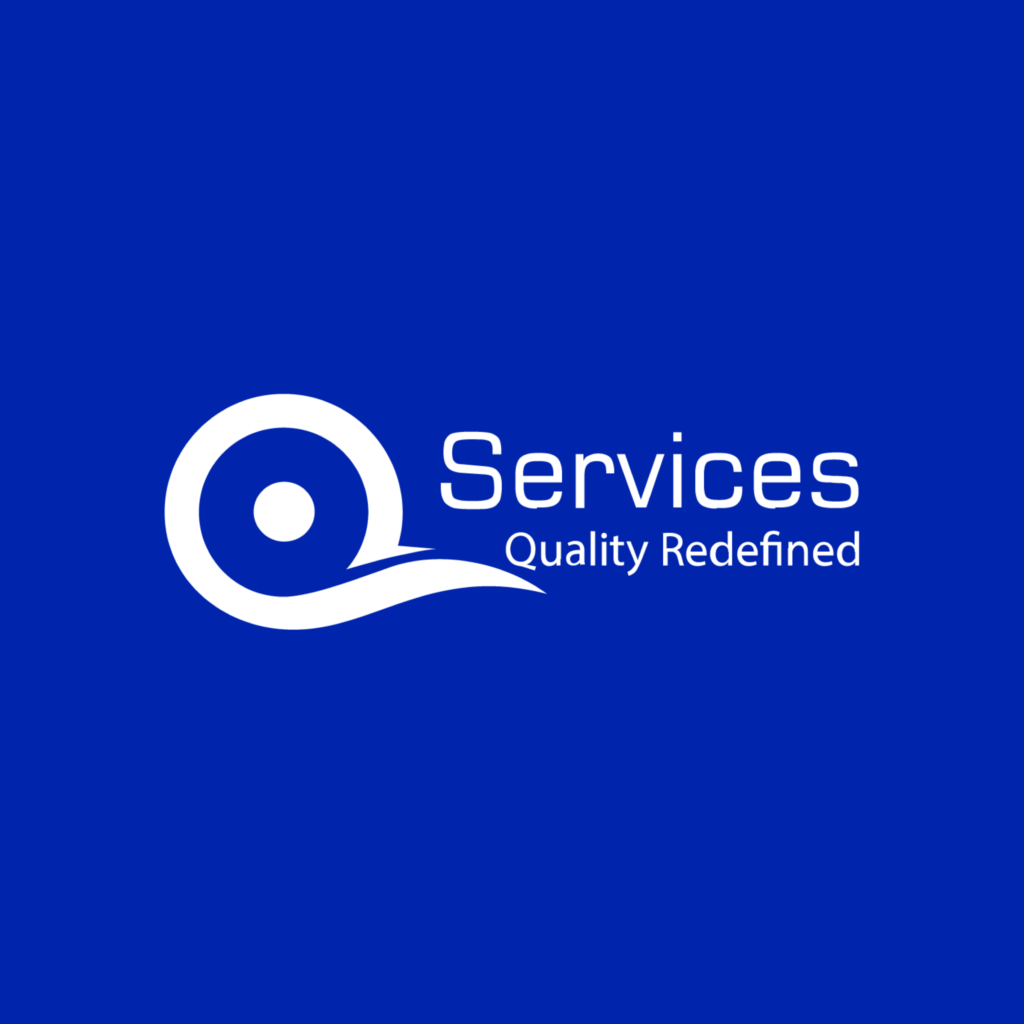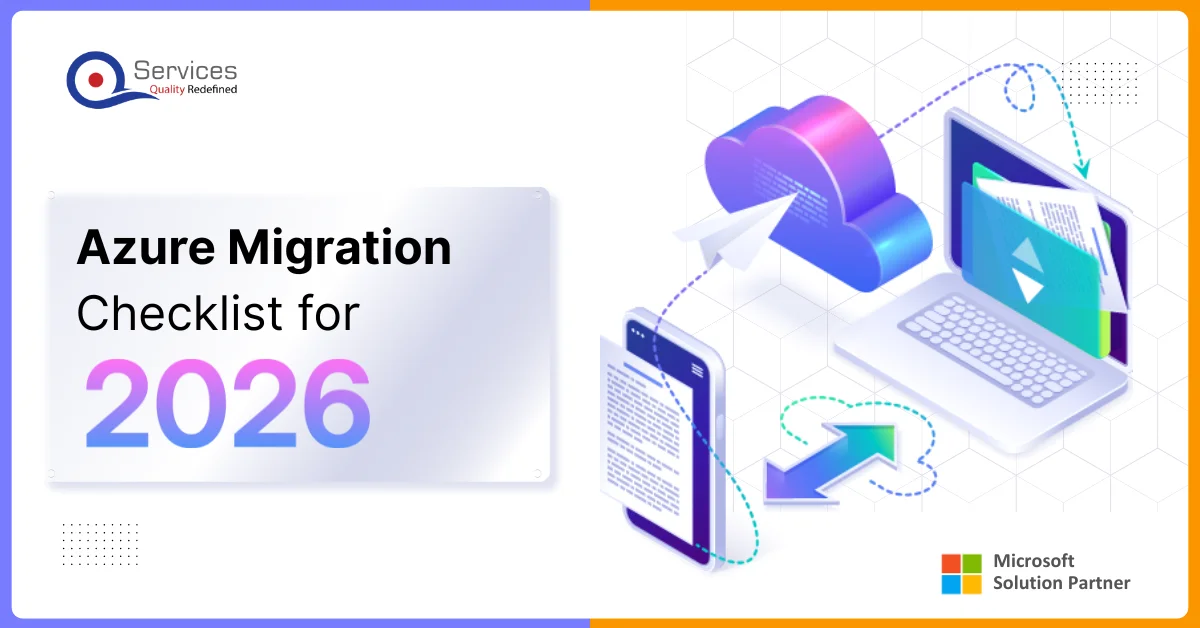
Home » Artificial Intelligence in Logistics: Optimizing Fleet Management with Azure AI Solutions

Artificial Intelligence (AI) is transforming logistics by enhancing fleet management to be smarter and more efficient. By employing AI tools such as machine learning and real-time data analysis, logistics companies can optimize operations significantly. This is crucial for overcoming key challenges faced by the industry:
In this blog, we’ll explore how Microsoft Power Automate RPA (Robotic Process Automation) can elevate your FinOps practices and drive operational efficiency. Here’s what you’ll learn:
73% of logistics companies report struggling with a severe shortage of drivers, which impacts their ability to operate smoothly.
71% of companies are dealing with escalating costs, including fuel and maintenance, which strain their budgets.
41% of fleet managers face difficulties in keeping up with changing regulations, adding to the complexity of fleet management.
53% of companies experience challenges in maintaining high levels of customer service and retention.
AI in logistics address these issues by improving route planning, predictive maintenance, and overall fleet efficiency, helping companies manage these pain points more effectively.
In this blog, we will:
Artificial intelligence (AI) is transforming logistics by integrating advanced technologies to enhance the supply chain and transportation processes. The role of artificial intelligence in logistics includes leveraging machine learning, data analytics, and natural language processing to streamline decision-making, optimize operations, and increase efficiency. AI in logistics not only automates routine tasks but also forecasts trends and provides real-time insights, enabling more strategic and informed decisions.
AI is transforming logistics by making operations smarter and more efficient:
AI accurately forecasts demand, anticipates maintenance needs, and optimizes inventory management. This reduces downtime and ensures resources are allocated efficiently, leading to smoother and more cost-effective operations.
AI-driven automation streamlines logistics tasks, from order processing to shipment tracking, minimizing errors and significantly speeding up workflows. This enhances reliability and frees up human workers for more complex tasks.
Artificial intelligence in logistics and transportation processes vast amounts of data in real-time, optimizing delivery routes, enhancing fleet management, and enabling swift adaptation to demand shifts or supply chain disruptions. This real-time insight ensures efficient operations and significantly improves customer satisfaction.
Get free Consultation and let us know your project idea to turn into an amazing digital product.
AI tools help in planning the best routes for fleet vehicles by looking at a lot of information, like traffic patterns, weather, and past routes. This helps reduce travel time, save fuel, and cut down on overall costs.
By using AI to optimize routes, UPS saved about 10 million gallons of fuel each year and reduced carbon emissions by 100,000 metric tons. This shows how AI can help save money and protect the environment.
AI-powered route planning helped DHL improve delivery efficiency by 15%, leading to big fuel savings and faster deliveries, showing how AI can directly boost performance.
AI, combined with GPS and IoT sensors, allows real-time tracking of fleet vehicles. This gives fleet managers up-to-date information on where vehicles are, how fast they’re moving, and which routes they’re taking.
Real-time tracking lets fleet managers adjust routes on the go, helping avoid delays and improving delivery times.
AI can predict when vehicles need maintenance based on real-time data, reducing downtime and keeping vehicles on the road longer.
By optimizing routes and schedules, companies can save on fuel and reduce operational costs, making their operations more efficient.
AI-powered systems like lane-keeping assistance, adaptive cruise control, and collision avoidance help drivers stay safe on the road, reducing the chances of accidents.
AI constantly monitors how drivers behave and gives real-time feedback if they’re driving unsafely, like braking too hard or speeding. This helps encourage safer driving.
AI looks at driver performance data to spot areas where they can improve and suggests training to help them get better.
Companies using AI safety systems have seen a 20% drop in accidents and a 15% reduction in insurance claims, showing how AI can make driving safer and reduce costs.
Predictive maintenance utilizes AI to analyse data from various sensors and historical records to predict when equipment is likely to fail. This allows for maintenance to be performed just in time, rather than on a fixed schedule, which can be inefficient.
ML algorithms analyze patterns in data to predict potential failures. For example, vibration data from machinery can indicate wear and tear, allowing for timely intervention.
IoT Sensors help to collect real time data on equipment performance that can be analyse by AI to forecast maintenance needs.
Microsoft Azure offers a comprehensive suite of AI services and tools designed to enhance fleet management operations. These services leverage advanced technologies to optimize various aspects of fleet management, from route planning to vehicle maintenance and driver safety.
Azure AI logistics solutions enhance fleet management with its significant features which include:
Robust tools provided by Azure to process and analyse large set of data generated by fleet operations, to derive actionable insights.
Azure Machine Learning allows for the creation and deployment of predictive models. These models can forecast maintenance needs, optimize routes, and enhance overall fleet performance.
Azure IoT services connect vehicles and assets to the cloud, enabling real-time monitoring and management.
Azure Machine Learning models forecast when a vehicle or equipment might fail, enabling proactive maintenance and minimizing downtime.
Machine learning algorithms analyze factors like traffic patterns and weather conditions to find the most efficient routes, cutting down on fuel consumption and travel time.
Azure Cognitive Services offer advanced NLP features that improve customer interactions. With these capabilities, chatbots and virtual assistants can efficiently handle inquiries and provide timely updates.
This service leverages video analysis to monitor driver behavior, identify unusual activities, and ensure adherence to safety standards, thereby enhancing overall fleet safety and compliance.
Azure IoT Hub offers real-time tracking of fleet vehicles, giving fleet managers current information on vehicle locations, speeds, and routes.
IoT sensors gather data on vehicle performance, which can be used to fine-tune maintenance schedules and boost operational efficiency.
Getting started with Azure Machine Learning (AML) for fleet management involves several key steps. Here’s a high-level overview to help you begin:
If you don’t already have one, sign up for an Azure account.
This is your central place to manage all your machine learning resources. You can create a workspace through the Azure portal or using the Azure CLI.
Gather data from your fleet management system, such as vehicle locations, maintenance records, fuel consumption, etc.
Ensure your data is clean and, in a format, suitable for machine learning. This might involve handling missing values, normalizing data, and splitting it into training and testing sets.
Depending on your AI logistics use cases, such as predictive maintenance or route optimization, select an appropriate machine learning model.
Use Azure Machine Learning to train your model. You can use the Azure ML Studio for a visual interface or the Python SDK for more control.
Measure the effectiveness of your model using key metrics such as accuracy, precision, recall, and others relevant to your objectives.
Fine-tune your model’s hyperparameters to enhance performance and ensure it delivers the best possible results.
Deploy your trained model as a web service endpoint in Azure. This enables seamless integration with your fleet management system for real-time predictions.
Validate the functionality of your deployed model by testing it with real-world data to ensure it performs as expected.
Continuously track the performance of your deployed model to ensure it maintains accuracy over time.
Periodically retrain the model with updated data to keep it relevant and maintain optimal performance.
Incorporate the model’s predictions into your fleet management system using the endpoint’s API.
Develop dashboards to visualize key metrics and set up alerts to notify you of any potential issues, enabling proactive management.

Use Case: Optimizing Fleet Management with Azure AI
Technologies and Methods: Microsoft utilized Azure IoT products to build a connected fleet management system. This included real-time vehicle data collection, predictive maintenance algorithms, and route optimization powered by machine learning.
Implementation: The system integrated Azure Machine Learning, Azure IoT Hub, and Azure Stream Analytics to monitor vehicle health, predict maintenance needs, and optimize routes.
Benefits: Enhanced vehicle uptime, reduced maintenance costs, and improved operational efficiency. Real-time insights enabled proactive decision-making.
Challenges: Initial system integration and data accuracy posed challenges, resolved through iterative testing and refinement.
Use Case: Enhancing Logistics with Azure AI
Technologies and Methods: Accenture deployed Azure AI and IoT to monitor vehicle performance, optimize routes, and predict maintenance needs, showcasing the powerful impact of AI and logistics. This included Azure Machine Learning for analytics and Azure IoT Hub for real-time data.
Implementation: IoT sensors were installed on vehicles, and machine learning models were integrated into the existing fleet management system.
Benefits: Significant reduction in downtime, improved fuel efficiency, and enhanced safety. Operational costs decreased, and fleet productivity increased.
Challenges: Data integration and scalability were key issues, addressed by leveraging Azure’s cloud infrastructure.
Artificial Intelligence (AI) is revolutionizing fleet management in logistics by enhancing efficiency and addressing key challenges such as driver shortages and rising operational costs. Azure AI solutions, with their advanced capabilities for predictive maintenance, route optimization, and real-time data analysis, contribute to improved vehicle uptime, reduced costs, and enhanced safety. Success stories from Microsoft and Accenture showcase the impactful benefits of integrating AI with fleet management systems. By adopting Azure’s machine learning, IoT integration, and analytics, businesses can streamline operations and stay competitive.
For a deeper understanding of “The Role of AI in Transforming Logistics Management with Software Solutions,” explore our related blog for comprehensive insights and detailed strategies.

Our Articles are a precise collection of research and work done throughout our projects as well as our expert Foresight for the upcoming Changes in the IT Industry. We are a premier software and mobile application development firm, catering specifically to small and medium-sized businesses (SMBs). As a Microsoft Certified company, we offer a suite of services encompassing Software and Mobile Application Development, Microsoft Azure, Dynamics 365 CRM, and Microsoft PowerAutomate. Our team, comprising 90 skilled professionals, is dedicated to driving digital and app innovation, ensuring our clients receive top-tier, tailor-made solutions that align with their unique business needs.

In 2026, moving workloads to Azure cloud migration is not just about transferring data. It’s about making the whole process smarter, more automatic, and easier to manage while keeping compliance and security tight.

The way small and medium-sized businesses (SMBs) operate has changed more in the past five years. Traditional systems that once felt reliable are now holding teams back. Data lives in silos, processes rely on too much manual work, and the cost of maintaining legacy servers keeps growing. So how do businesses modernize without disrupting what’s already working?

In an era where technology shifts faster than any corporate strategy can keep up, the real concern for IT leaders is how their organization can leverage Microsoft effectively without disrupting operations. This is where the Microsoft Solutions Partner program becomes relevant.
AI plays a crucial role in fleet management by optimizing route planning, predicting maintenance needs, reducing fuel consumption, and improving overall operational efficiency. It leverages machine learning and predictive analytics to make data-driven decisions.
Azure AI provides advanced tools and services that help logistics companies analyze vast amounts of data, optimize routes, predict vehicle maintenance, and improve fuel efficiency. It integrates seamlessly with existing systems to provide real-time insights and automation.
Predictive maintenance uses AI to analyze data from vehicle sensors to predict when maintenance is needed. This helps prevent unexpected breakdowns, reduces downtime, and ensures vehicles are always in optimal condition for their routes.
Yes, AI can significantly reduce fuel consumption by optimizing driving behavior, vehicle performance, and route planning. AI-driven fuel management systems provide real-time feedback to drivers on how to drive more efficiently.
AI helps in reducing fuel consumption and emissions, leading to a smaller carbon footprint. By optimizing routes and maintenance schedules, AI contributes to more sustainable and environmentally friendly logistics operations

Founder and CEO

Chief Sales Officer
